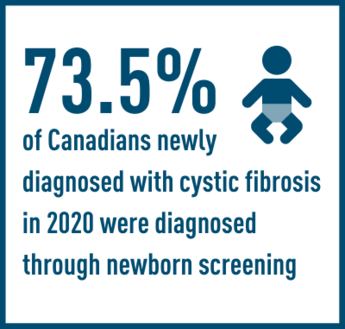Cystic Fibrosis Canada calls on provinces to use newest Standards of Care Guidelines and enable urgent access to the life-changing drug, Trikafta
TORONTO (August 2021) - Cystic Fibrosis Canada has published new standardized care guidelines for modulator use in Canada. These guidelines will provide cystic fibrosis (CF) clinicians across Canada with important information on best practice use of the CF modulator drugs Trikafta, Orkambi, Kalydeco and Symdeko when treating CF patients in Canada. With these guidelines in hand, Cystic Fibrosis Canada calls upon provincial governments to fund Trikafta and other modulators today and to follow the standards set out in the guidelines for access.
The guidelines, named Initiation, Monitoring and Discontinuation of CFTR Modulator Therapies for Patients with Cystic Fibrosis, were an initiative of Cystic Fibrosis Canada’s Healthcare Advisory Council and have been endorsed by CF physicians across Canada. According to Ian McIntosh, Director of Healthcare at Cystic Fibrosis Canada, “…the Healthcare Advisory Council identified and appointed a working group of healthcare professionals to develop these guidelines – these clinicians and physicians have been involved in clinical trials or compassionate use of modulators, and as such, these are the medical professionals who have the inside knowledge and experience, specifically with modulators, and who know best”.
McIntosh also notes that, if followed, the standardized care guidelines will help Canadians with cystic fibrosis by ensuring that modulators are prescribed to their best efficacy, and that patients are monitored, so that those who will benefit from modulators, will continue to benefit from them over time.
The fight for access to Trikafta
The release of the guidelines is timely. They are already being used as a resource in the fight for access to the break-through CF drug, Trikafta, which was approved by Health Canada on June 18th, 2021.
On July 8, 2021, the Canadian Agency for Drugs and Technology in Health (CADTH) shared their draft recommendation for Trikafta. Despite a positive recommendation to list the drug, the overly restrictive criteria CADTH recommended (if implemented) would see access to Trikafta restricted for more than 25% of those who could benefit from it. Youth especially would be impacted by the criteria, at a critical time in their development when the focus should be on preventing lung deterioration.
Patient, physician, and researcher groups provided feedback to CADTH on the draft recommendations. In collaboration with CF clinicians and researchers, Cystic Fibrosis Canada made submissions to provide feedback to CADTH.
The standardized care guidelines were included in CF Canada’s submission providing feedback on the draft recommendation released by CADTH – emphasizing the importance of input and feedback on prescribing and monitoring modulators, from CF experts and medical professionals with knowledge-based experience.
In addition to this feedback from CF Canada, the manufacturer of Trikafta has requested a major reconsideration of CADTH’s draft recommendations, a process which could take an additional 2-3 months. Canadians living with CF have waited long enough. Cystic Fibrosis Canada is calling upon Premiers and Health Ministers to make Trikafta available on their public formularies now and to rely on the expert advice provided in the guidelines, as the medically endorsed basis for access.
--
About cystic fibrosis
Cystic fibrosis is the most common fatal genetic disease affecting Canadian children and young adults. There is no cure. Of the Canadians with cystic fibrosis who died in 2018, half were under the age of 33. Cystic fibrosis is a progressive, degenerative multi-system disease that affects mainly the lungs and digestive system. In the lungs, where the effects are most devastating, a build-up of thick mucus causes severe respiratory problems. Mucus and protein also build up in the digestive tract, making it difficult to digest and absorb nutrients from food. In addition to the physical effects of the disease, mental health concerns are emerging; anxiety and depression are common among this population. Double lung transplants are the final option for patients with end-stage disease; most fatalities of people with CF are due to lung disease.
About Cystic Fibrosis Canada
Cystic Fibrosis Canada has dramatically changed the cystic fibrosis story. We have advanced research and care that has more than doubled life expectancy. Since being founded by parents in 1960, Cystic Fibrosis Canada has grown into a leading organization with a central role engaging people living with cystic fibrosis, parents and caregivers, volunteers, researchers and healthcare professionals, government and donors. We work together to change lives through treatments, research, information and support. Despite our remarkable progress together, we are not yet done. Not when a child with cystic fibrosis still has only a 50% chance of living to 52. We will keep pushing, keep going further until all people with cystic fibrosis can and do experience everything life has to offer — and enjoy everything life has to offer. Learn more at www.cysticfibrosis.ca




